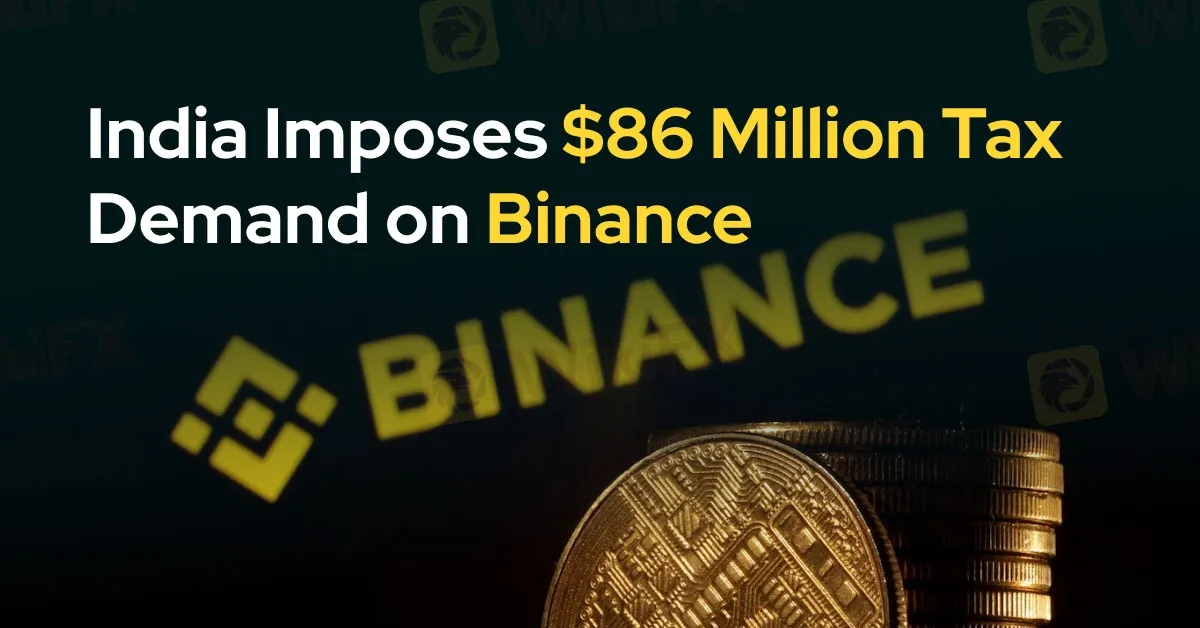简体中文
繁體中文
English
Pусский
日本語
ภาษาไทย
Tiếng Việt
Bahasa Indonesia
Español
हिन्दी
Filippiiniläinen
Français
Deutsch
Português
Türkçe
한국어
العربية
India Imposes $86 Million Tax Demand on Binance
Abstract:The Indian government is asserting its regulatory authority in the cryptocurrency sector, issuing a substantial $86 million tax demand to Binance.

The Indian government is asserting its regulatory authority in the cryptocurrency sector, issuing a substantial $86 million tax demand to Binance, the worlds leading cryptocurrency exchange. This action follows the earlier ban on Binance and other offshore exchanges in 2024 for non-compliance with Indian regulations.
In April, Binance expressed its intention to re-enter the Indian market, but this goal has encountered significant challenges. On August 6, the Directorate General of Goods and Service Tax Intelligence (DGGI) served a tax notice to Binance under the Goods and Services Tax (GST) laws. Indian authorities allege that Binance collected at least $48 million in transaction fees from Indian users, with these funds purportedly deposited in an account associated with a Seychelles-based Binance affiliate.

This tax demand marks a pivotal moment as the first instance of the Indian government targeting a cryptocurrency exchange. Initial efforts to communicate with Binance offices abroad were unsuccessful, leading to the engagement of Indian legal counsel to address the tax dispute.
The Indian governments action underscores its increased focus on regulating offshore crypto exchanges operating outside the GST framework, which imposes tax rates ranging from 5% to 28% on transactions, with additional fees for specific services.
Binances previous success in the Indian market may be partly attributed to its alleged non-compliance with local tax laws, which require a 1% tax deducted at source (TDS) on all crypto transactions. Indian regulations also mandate that crypto service providers and investors deduct a 1% TDS and levy a 30% tax on crypto investment profits. While domestic exchanges such as WazirX and CoinDCX comply with these tax requirements, many offshore exchanges have not.
Initially, Binance proposed a $2 million settlement to resolve its non-compliance and regain access to the Indian market. However, the current $86 million tax demand aims to recover the transaction fees accumulated from Indian users during Binances prior operations.
Notably, this tax demand appears to be specifically directed at Binance. Other foreign crypto exchanges, including Huobi, Kraken, and several others, have not yet received similar tax notices from Indian authorities. This situation raises questions about the future regulatory landscape for offshore crypto exchanges in India and the potential for further government actions.
This development highlights Indias intent to enforce stringent regulatory measures on the cryptocurrency market, ensuring compliance with local tax laws and protecting the integrity of its financial system. As the country continues to refine its approach to cryptocurrency regulation, the actions taken against Binance may set a precedent for how other offshore exchanges will be treated in the future.

Disclaimer:
The views in this article only represent the author's personal views, and do not constitute investment advice on this platform. This platform does not guarantee the accuracy, completeness and timeliness of the information in the article, and will not be liable for any loss caused by the use of or reliance on the information in the article.
Read more

Gigamax Scam: Tracking Key Suspects in RM7 Million Crypto Fraud
Malaysian authorities are actively pursuing seven individuals linked to the Gigamax investment scam, which has defrauded investors of over RM7 million. The suspects include an Indonesian national, identified as Awaludin, who is believed to be the mastermind behind the scheme, and six Malaysians who served as promoters and speakers for the fraudulent operation.

Singaporean Arrested in Thailand for 22.4 Million Baht Crypto Scam
Thai authorities have apprehended a 32-year-old Singaporean man suspected of being part of a transnational syndicate involved in cryptocurrency scams. The group is accused of defrauding victims of more than 22.4 million baht (S$886,000) through a fraudulent trading platform.

Kraken and BitGo to Handle FTX Payouts Starting January 2025
Kraken and BitGo will oversee the first FTX payouts starting January 3, 2025. 98% of creditors receive at least 118% of their claims in cash.

FCA Seeks Input to Shape UK Crypto Market Regulations
UK FCA seeks public feedback on crypto rules to improve market transparency, protect consumers, and support growth. Comments are open until March 2025.
WikiFX Broker
Latest News
Spotware Unveils cTrader Store, Global Marketplace for Algo Creators
Elderly Trader Loses RM2.1M in WhatsApp Forex Scam
Gigamax Scam: Tracking Key Suspects in RM7 Million Crypto Fraud
Singaporean Arrested in Thailand for 22.4 Million Baht Crypto Scam
Trader Turns $27 Into $52M With PEPE Coin, Breaking Records
ASIC Sues HSBC Australia Over $23M Scam Failures
WikiFX Review: Is IQ Option trustworthy?
CFI Partners with MI Cape Town, Cricket Team
Doo Financial Expands Reach with Indonesian Regulatory Licenses
5 Questions to Ask Yourself Before Taking a Trade
Currency Calculator



